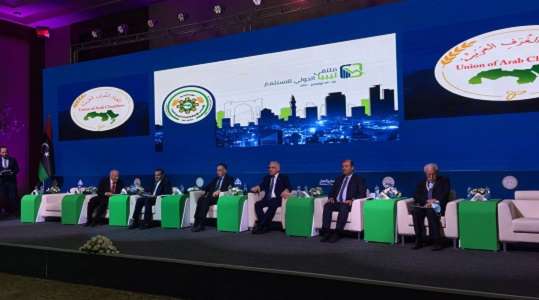The activities of the 19th Conference of Arab Businessmen and Investors, held in Tripoli / Libya at the JW Marriott Hotel Hall, during the period 28-29/11/2021, were concluded on 29/11/2021 under the title: Investing in Libya is Promising for Development and Reconstruction, which was held under the auspices of the Prime Minister In the government of national unity is the state of Abdul Hamid Dbeibeh, organized by the Union of Arab Chambers and the General Federation of Chambers of Commerce, Industry and Agriculture in Libya, and in cooperation with the General Secretariat of the League of Arab States, the Arab Investment and Export Credit Guarantee Corporation, Al-Iktissad Wal-Aamal Group, and the General Authority for Investment Promotion Affairs and Privatization.
After discussing many topics in seven discussion panels with various topics and the interventions accompanying these sessions, and listening to many opening and closing speeches that permeated the conference from the ministers and officials. The participants in the conference commended the plans made by the State of Libya for institutional reform, improving the investment environment, and the new vision and strategy for recovery on sustainable basis, which promises to open up huge areas for reconstruction and a strong renaissance to build a modern, diversified and developed economy.
The conference welcomed the huge reconstruction workshops and the projects being implemented in the sectors of roads, transportation, bridges, ports, communications, energy, health, education, aviation, trade, industry, tourism, banking, regulation, administration and social affairs, which would achieve an economic boom that would benefit the Libyan citizen and local companies after moving the wheel of the economy and the return of development again after a pause of years.
The conference also greeted the many advantages granted to investment, including the exemption of machinery, equipment, and devices necessary for the implementation of the project from all taxes, customs fees, supply services fees and other fees and taxes of similar effect, exemption of goods produced for the purpose of export from production tax and from customs duties and taxes imposed on export, and exempting the investment project from income tax for its activity for a period of five years that can be extended, exempting profits resulting from the project’s activity if reinvested, the freedom to re-transfer capital abroad, and many other incentives.
The conference reached a number of results, recommendations and proposals, including the following:
· Enhancing security stability, which contributes to stimulating investment.
· Accelerating the pace of economic recovery, resuming the provision of basic services, and improving the investment environment, based on the new reform and sustainable development policy.
· Encouraging investment in building the destroyed cities and in infrastructure such as roads, ports, airports, digitization, energy, water, health, education, tourism and other sectors that need maintenance or reconstruction, and restarting the many stalled factories, in addition to completing other projects that were disrupted due to the previous difficult conditions.
· Giving more space for the private sector to invest in diversifying the economy and increasing the contribution of other non-oil sectors to it.
· Activating the role of chambers of commerce and businessmen councils and exchanging visits between Arab and Libyan investors.
· Reactivating agreements with brotherly and friendly countries, facilitating the entry of businessmen, canceling entry visas for Arab business owners, and linking ports and airports with Arab countries to activate commercial transport.
· Overcoming the difficulties faced by Arab investors, facilitating bank transfers, and applying tax exemptions in accordance with the Foreign Investment Law in Libya.
· Expedite the completion and activation of industrial and service areas and special areas.
· Encouraging small and medium enterprises, and opening opportunities for Libyan youth to lead economic institutions.
· Supporting private sector projects in the field of food security, especially those based on vertical farming and modern technology.
· Providing social assistance to the neediest groups.
· Emphasizing that the educational outputs comply with the requirements of the labor market.
· Modifying the development model followed in the country in line with sustainable development.
· Develop a program to reduce investment and production costs, and conduct an objective evaluation of investment costs and incentives compared to other countries.
· Reconsidering the state's public structures and their legal frameworks to be compatible with the stage.
· Emphasis on the continuation of the Central Bank to provide full support to the private sector.
· Inviting investors to participate in the management and operation of companies and projects affiliated with the Alinma Fund.
· Inviting investors to participate with the Libya Africa Portfolio to invest in sustainable development projects.
· Expedite the resolution of the outstanding issues of the rights of the previous companies.
· Expedite the opening of new outlets with neighboring countries.
· Establishing a mechanism that supports investors in ensuring their projects against non-commercial risks.
· Ensuring the entry of funds into investment funds by way of financial insurance, away from sovereign and international guarantees.
· Inviting investors to invest in renewable energy projects.
· Promote the investment map, with the need for this map to include sufficient data for the projects that are prepared through specialized offices and in cooperation with the concerned ministries.
In conclusion, the participants expressed their thanks and appreciation to the Union of Arab Chambers, the General Federation of Chambers of Commerce, Industry and Agriculture in Libya and Al-Iktissad Wal-Aamal Group, for the good efforts that were made to organize and succeed this conference. They also expressed their deep appreciation to the Federation of Libyan Chambers, for their kindness, hospitality and warm reception. They also extended their deep thanks and appreciation to the Prime Minister of the National Unity Government, Abdul Hamid Dbeibeh, for his generous patronage, great interest, and generous facilities that were provided to the conference. Thanks are due to the General Authority for Investment Promotion Affairs and Privatization, for the full cooperation and for putting all possibilities at the disposal of the conference because of its importance in restoring life to dear Libya to regain its pioneering role that it deserves.

